外研版英语八年级上册Module 8 Accidents Unit 1课件+嵌入音频(共42张PPT)
文档属性
| 名称 | 外研版英语八年级上册Module 8 Accidents Unit 1课件+嵌入音频(共42张PPT) |  | |
| 格式 | pptx | ||
| 文件大小 | 4.4MB | ||
| 资源类型 | 教案 | ||
| 版本资源 | 外研版 | ||
| 科目 | 英语 | ||
| 更新时间 | 2023-08-20 13:25:23 | ||
图片预览


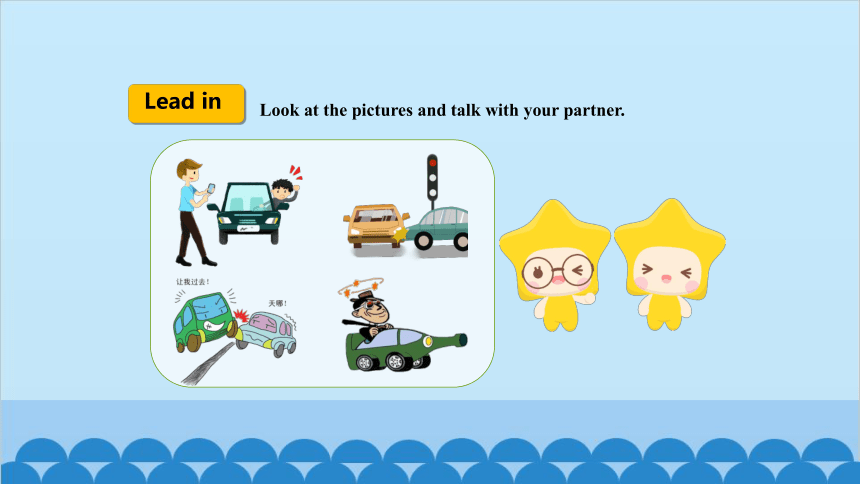
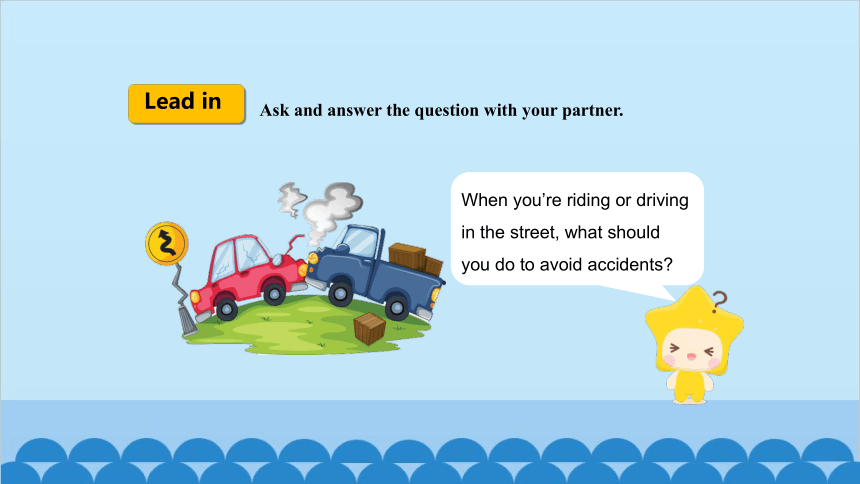
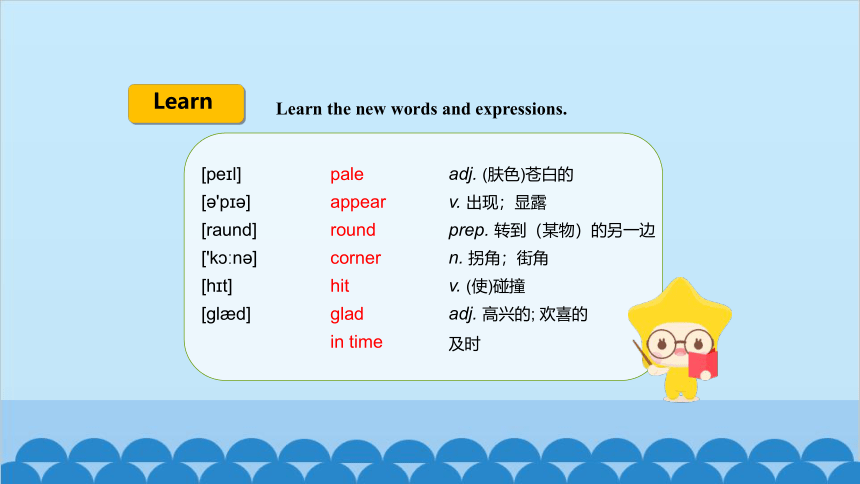
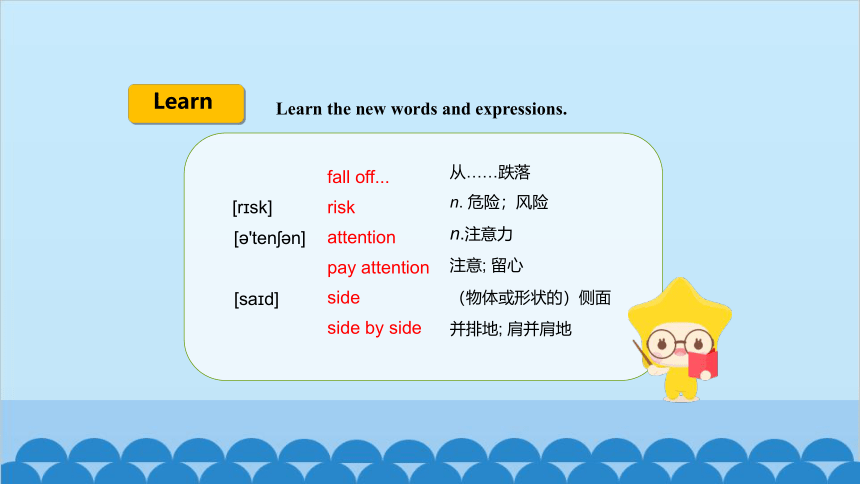
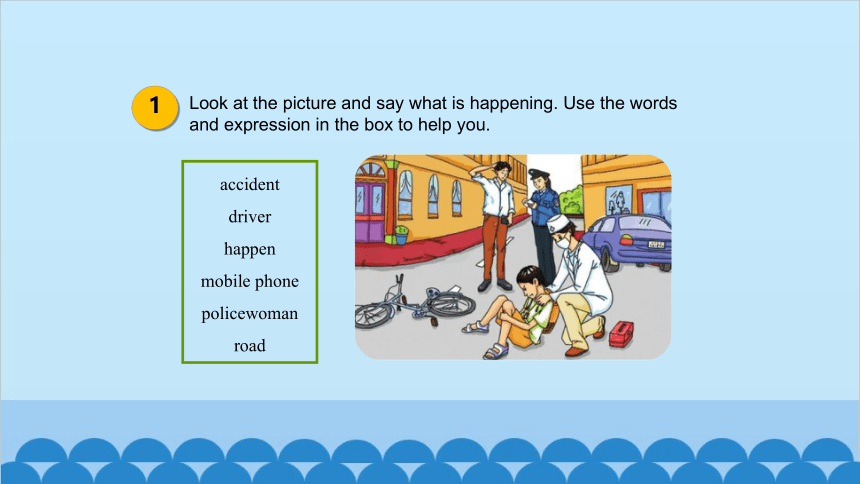
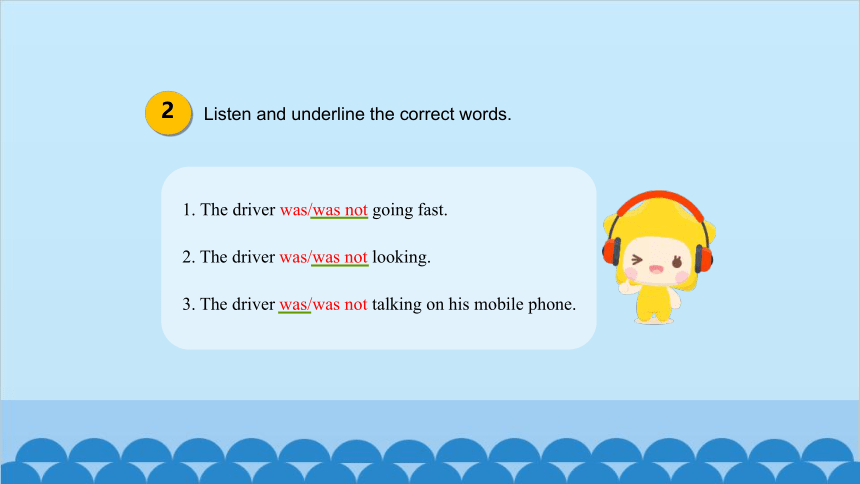
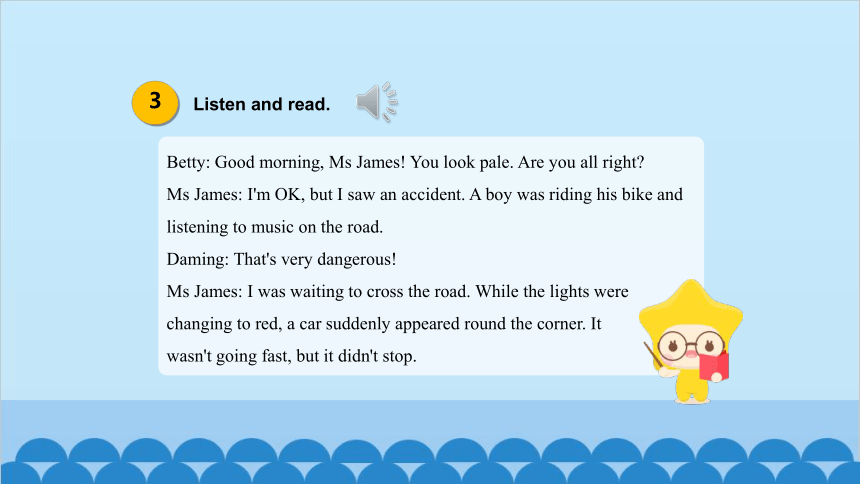
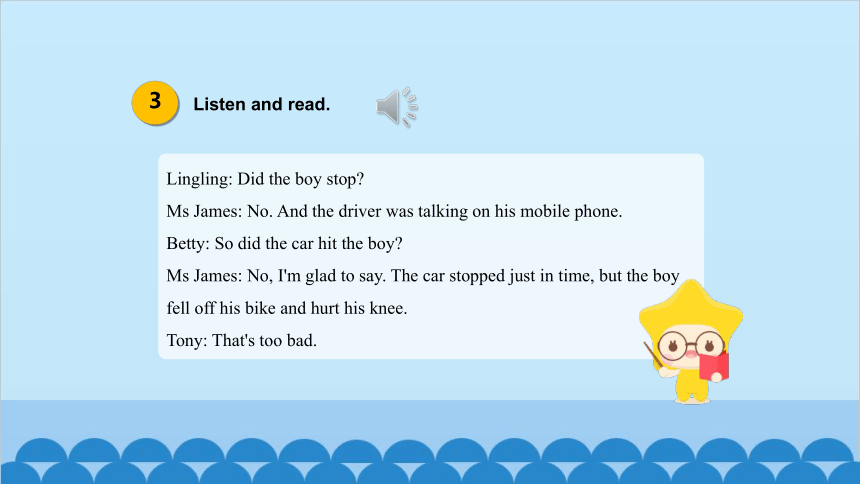
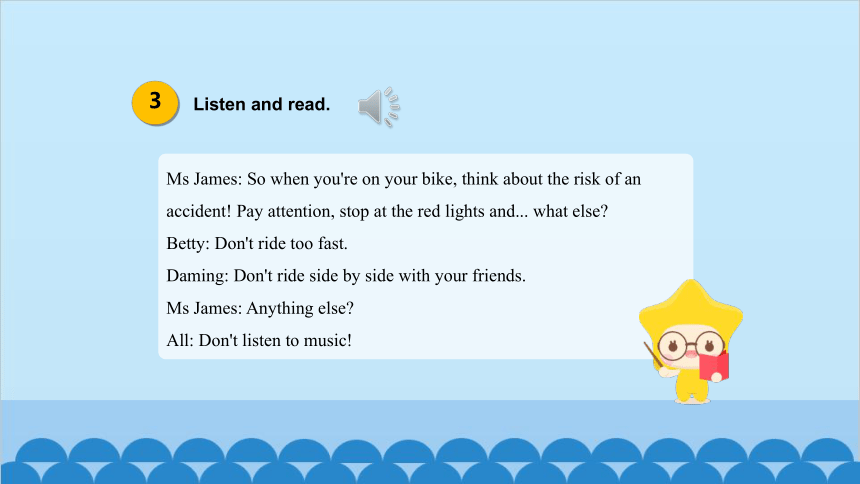

文档简介
(共42张PPT)
初中英语 外研版 八年级上
Unit 1
While the lights were changing to red, a car suddenly appeared.
Module 8 Accidents
1. To learn the vocabulary in Unit 1.
2. To learn the past continuous tense.
3. To listen and understand the dialogue on page 64.
Lead in
Look at the pictures and talk with your partner.
When you’re riding or driving in the street, what should you do to avoid accidents
Lead in
Ask and answer the question with your partner.
Learn the new words and expressions.
[pe l]
[ 'p ]
[raund]
['k n ]
[h t]
[ɡl d]
adj. (肤色)苍白的
v. 出现;显露
prep. 转到(某物)的另一边
n. 拐角;街角
v. (使)碰撞
adj. 高兴的; 欢喜的
及时
pale
appear
round
corner
hit
glad
in time
Learn
Learn the new words and expressions.
[sa d]
从……跌落
n. 危险;风险
n.注意力
注意; 留心
(物体或形状的)侧面
并排地; 肩并肩地
fall off...
risk
attention
pay attention
side
side by side
Learn
[r sk]
[ 'ten n]
accident
driver
happen
mobile phone
policewoman
road
1
Look at the picture and say what is happening. Use the words and expression in the box to help you.
The driver was/was not going fast.
The driver was/was not looking.
The driver was/was not talking on his mobile phone.
2
Listen and underline the correct words.
Betty: Good morning, Ms James! You look pale. Are you all right
Ms James: I'm OK, but I saw an accident. A boy was riding his bike and listening to music on the road.
Daming: That's very dangerous!
Ms James: I was waiting to cross the road. While the lights were changing to red, a car suddenly appeared round the corner. It
wasn't going fast, but it didn't stop.
3
Listen and read.
Lingling: Did the boy stop
Ms James: No. And the driver was talking on his mobile phone.
Betty: So did the car hit the boy
Ms James: No, I'm glad to say. The car stopped just in time, but the boy fell off his bike and hurt his knee.
Tony: That's too bad.
3
Listen and read.
Ms James: So when you're on your bike, think about the risk of an accident! Pay attention, stop at the red lights and... what else
Betty: Don't ride too fast.
Daming: Don't ride side by side with your friends.
Ms James: Anything else
All: Don't listen to music!
3
Listen and read.
1. Who saw the accident
Ms James.
2. Did the car stop just in time
Yes, it did.
3. What was the boy doing when he was riding his bike
He was listening to music.
Practice
Read the dialogue and answer the questions.
4. When did a car suddenly appear round the corner
While the lights were changing to red.
5. Did the boy fall off his bike
Yes, he did.
Practice
Read the dialogue and answer the questions.
When you are riding a bike, think about the risk of an accident!
Pay ________ and stop at the ________.
Don’t ____ too fast.
Don’t ride __________ with your friends.
Don’t _____________!
attention
red lights
ride
side by side
listen to music
3
Now complete the following advice.
Practice
Learn the phrases by heart.
骑自行车
用手机(打电话)
听音乐
及时
从……跌落
on the bike
on the mobile phone
listen to music
in time
fall off
Practice
Learn the phrases by heart.
考虑
并排,肩并肩
注意……
红绿灯
拐角附近
think about
side by side
pay attention (to)...
the traffic lights
round the corner
Are you all right
That’s very dangerous!
That’s too bad.
Anything else
Everyday English
知识讲解
1. I was waiting to cross the road. 我正在等着过马路。
(1) wait动词,意为“等;等候”,常与介词for搭配使用,意为“等候……”。
e.g. She is waiting to take a taxi. 她正在等着坐出租车。
We're waiting for the teacher to open the present.
我们正在等着老师打开礼物。
(2) cross作动词,意为“穿过;越过”,表示从一侧到另一侧。
e.g. Thousands of animals are crossing the wide river.
成千上万的动物正穿过这条宽阔的河流。
知识讲解
2. While the lights were changing to red, a car suddenly appeared round the corner.
当交通灯正要变成红色时,一辆汽车突然出现在拐角处。
(1) appear不及物动词,意为“出现;显露”,反义词为disappear“消失”。
e.g. A tall man with glasses appeared from behind a tree.
一个戴眼镜的高个男子从树后面冒了出来。
(2) round作介词,意为“转到(某物的)另一边;绕过”。
e.g. The man ran round the corner and disappeared.
男子跑过拐角处,不见了。
2. While the lights were changing to red, a car suddenly appeared round the corner.
当交通灯正要变成红色时,一辆汽车突然出现在拐角处。
(3) corner名词,意为“拐角;街角”。
e.g. Put the box in the corner of the room.
把这个箱子放在房间的角落里。
The restaurant is at/on the corner of the street.
那家饭店在街道的拐角处。
知识讲解
3. So did the car hit the boy
那么那辆汽车撞到男孩了吗?
hit动词,意为“(使)碰撞”,其过去式为hit。
e.g. Her car hit a big tree and she hurt her back in the accident.
她的汽车撞到了一棵大树,她在这次事故中伤了后背。
知识讲解
【拓展】 hit还可表示“击;打”
常用短语:hit sb./sth. with sth. “用某物击打某人/某物”;
hit sb. in/on the+身体部位“打/踢某人某个部位”。
其中,on表示所击打部位较硬,in表示所击打部位较柔软(会陷进去)。
e.g. Betty hit the ball with a baseball bat. 贝蒂用棒球棍击球。
The ball hit him in the stomach. 那个球击中了他的肚子。
When Daming was walking in the street, a stone hit him on the head.
大明正在大街上走时,一块石头击中了他的头部。
知识讲解
4. No, I'm glad to say. 没有,我很高兴地说。
glad(pleased; happy)形容词,意为“高兴的;欢喜的”,仅用于系动词之后作表语,不能用于名词之前作定语。
常见搭配:
(be) glad to do sth. “高兴/乐意做某事”,常用于情景交际中。
e.g. Glad to meet you. 见到你很高兴。
I'm glad to hear you are feeling better.
听说你感觉好些了,我很高兴。
知识讲解
5. The car stopped just in time, but the boy fell off his bike and hurt his knee.
汽车刚好及时停了下来,但是男孩从自行车上摔了下来并伤了膝盖。
(1) in time意为“及时”。
e.g. We were glad that they could arrive in time.
我们很高兴他们能及时到来。
知识讲解
【辨析】 in time与on time
① in time“及时”,指在约定的时间之前。
e.g. The police came just in time. 警察刚好及时赶到。
② on time“准时”,指正好在约定的时间。
e.g. The train arrived at the station on time. 火车准时进站。
(2) fall off意为“从……跌落/摔下来”,相当于fall down from。
e.g. The boy fell off the bike.=The boy fell down from the bike.
男孩从自行车上摔了下来。
知识讲解
6. So when you're on your bike, think about the risk of an accident!
所以当你骑自行车时,考虑一下事故的风险!
risk作名词,意为“危险;风险”
常用搭配:the/a risk of ... “……的风险”;
take risks/a risk “冒风险”;
at risk “有危险;冒风险”;
a risk to “对……有危险”。
知识讲解
e.g. Overweight may increase the risk of developing heart disease.
超重可能会增加患心脏病的风险。
Jim likes taking risks.
吉姆喜欢冒险。
Risk comes from not knowing what you're doing.
风险来自你不知道你正在做什么。
知识讲解
7. Pay attention, stop at the red lights and... what else
注意,红灯时要停下来……还有什么?
pay attention 意为“注意;留心”。
pay attention to意为“注意……”,to是介词,其后可接名词、代词或
动词-ing形式作宾语。
e.g. Pay attention! The party will start in five minutes.
注意!五分钟后聚会将开始。
知识讲解
You should pay more attention to your health.
你应该多关注你的健康。
【注意】
attention常用于口语或通知中,以引起人们的注意。
e.g. Attention, please!
请注意!
知识讲解
8. Don't ride side by side with your friends.
不要和你的朋友们并排骑车。
side by side意为“并排地;肩并肩地”。
e.g. They were walking along the beach side by side.
他们正并肩沿着沙滩散步。
【拓展】
side by side是“名词+介词+名词”构成的短语,其中名词前无
须加冠词。
知识讲解
Complete the passage with the words in the box.
Accidents do not happen very often, I’m (1) _____ to say. However,
when you’re riding your bike, pay (2) ________ all the time,
especially on the corner of the road and at traffic lights. Don’t ride
side by (3) ____ with your friends. Sometimes cars (4) ______ round
the corner and don’t stop. They may (5) _____ you.
4
appear attention glad hit side
glad
attention
side
appear
hit
1. While the lights were changing to red, a car suddenly appeared round the corner.
2. When I was waiting to cross the road, the accident happened.
Listen and mark when the speaker pauses.
5
Now listen again and repeat.
知识讲解
过去进行时表示过去某一具体时间正在发生的动作。
时间标志:
at…yesterday morning, at that time, from nine to ten, last evening
过去进行时还可以和when, while, as引导的过去的时间状语从句连用。
e.g. 正当交通信号灯要变成红灯的时候,一辆小轿车突然从拐角处驶
出来。
While the lights were changing to red, a car suddenly appeared round
the corner.
过去进行时
(1) when可以和延续性动词连用,也可以和终止性动词连用;
而while只能和延续性动词连用。
e.g.当我们到达车站时正下着雪。
It was snowing when we reached the station. (reach为终止性动词)
我们吃饭的时候他们到了。
They arrived while/when we were having dinner. (have为延续性动词)
知识讲解
when和 while 的区别
知识讲解
(2) when引导的时间状语从句,主句是过去进行时,从句应该用一般过去时,
表示一个动作正在进行的时候另一个动作突然发生了,强调后一动作发生的突然性。
e.g. 我们正在讲话,老师(突然)进来了。
We were talking when the teacher came in.
(3) 当主句和从句的动作都是延续的或同时发生的,两句都用过去进
行时的时候,多用while引导。
e.g. 他们在唱歌,我们在跳舞。
They were singing while we were dancing.
when和 while 的区别
知识讲解
【练习】翻译
一天, 当他正在工作时, 一条蛇钻了出来。
One day, when he was working, a snake appeared.
我正试图捡起(那蛇), 突然它又咬了我一口。
I was trying to pick it up when it bit me again.
医生给他做检查时,疼痛加剧了。
While the doctors were checking him, the pain got worse.
过去进行时
Work in groups of four.
6
Student A:
You are a policeman at an accident scene in the street. Ask people questions.
Students B, C and D:
You saw the accident. Answer the policeman's questions.
A: What were you doing when the accident happened
B: When the accident happened, I was walking along the street.
C: When the accident happened,...
D: ...
1. 那个护士脸色看起来苍白。
The nurse _______ _____.
2. 还有其他什么事吗?
_________ ____
3. 骑自行车时, 一定要考虑发生事故的危险。
When you _____ ____ your bike, think about ____ ____ ____
an accident.
looks pale
are on
Anything else
the risk of
Exercise
根据汉语完成句子
Exercise
单项选择
1. Ted fell______ his bicycle while he______ it and hurt himself.
A. off; was riding
B. off; rode
C. down; were riding
D. down; was riding
2. The doctor came______ and he was saved.
A. on time B. in time
C. for a time D. at times
A
B
Exercise
单项选择
3. —Why didn’t you go to the cinema with us that afternoon
—I______ at the station for my uncle from Beijing.
A. was waiting
B. have waited
C. am waiting
D. will wait
4. Lingling______ a paper kite at 7:00 yesterday.
A. makes B. is making
C. will make D. was making
A
D
1. Recite the dialogue on page 64.
2. Complete the exercise in the workbook.
Homework
1. 礼让礼让,人车无恙。
2. 违章是事故的先导。
3. 做一名美和爱的使者。
4. 心存侥幸,必遭不幸。
Remember
初中英语 外研版 八年级上
Unit 1
While the lights were changing to red, a car suddenly appeared.
Module 8 Accidents
1. To learn the vocabulary in Unit 1.
2. To learn the past continuous tense.
3. To listen and understand the dialogue on page 64.
Lead in
Look at the pictures and talk with your partner.
When you’re riding or driving in the street, what should you do to avoid accidents
Lead in
Ask and answer the question with your partner.
Learn the new words and expressions.
[pe l]
[ 'p ]
[raund]
['k n ]
[h t]
[ɡl d]
adj. (肤色)苍白的
v. 出现;显露
prep. 转到(某物)的另一边
n. 拐角;街角
v. (使)碰撞
adj. 高兴的; 欢喜的
及时
pale
appear
round
corner
hit
glad
in time
Learn
Learn the new words and expressions.
[sa d]
从……跌落
n. 危险;风险
n.注意力
注意; 留心
(物体或形状的)侧面
并排地; 肩并肩地
fall off...
risk
attention
pay attention
side
side by side
Learn
[r sk]
[ 'ten n]
accident
driver
happen
mobile phone
policewoman
road
1
Look at the picture and say what is happening. Use the words and expression in the box to help you.
The driver was/was not going fast.
The driver was/was not looking.
The driver was/was not talking on his mobile phone.
2
Listen and underline the correct words.
Betty: Good morning, Ms James! You look pale. Are you all right
Ms James: I'm OK, but I saw an accident. A boy was riding his bike and listening to music on the road.
Daming: That's very dangerous!
Ms James: I was waiting to cross the road. While the lights were changing to red, a car suddenly appeared round the corner. It
wasn't going fast, but it didn't stop.
3
Listen and read.
Lingling: Did the boy stop
Ms James: No. And the driver was talking on his mobile phone.
Betty: So did the car hit the boy
Ms James: No, I'm glad to say. The car stopped just in time, but the boy fell off his bike and hurt his knee.
Tony: That's too bad.
3
Listen and read.
Ms James: So when you're on your bike, think about the risk of an accident! Pay attention, stop at the red lights and... what else
Betty: Don't ride too fast.
Daming: Don't ride side by side with your friends.
Ms James: Anything else
All: Don't listen to music!
3
Listen and read.
1. Who saw the accident
Ms James.
2. Did the car stop just in time
Yes, it did.
3. What was the boy doing when he was riding his bike
He was listening to music.
Practice
Read the dialogue and answer the questions.
4. When did a car suddenly appear round the corner
While the lights were changing to red.
5. Did the boy fall off his bike
Yes, he did.
Practice
Read the dialogue and answer the questions.
When you are riding a bike, think about the risk of an accident!
Pay ________ and stop at the ________.
Don’t ____ too fast.
Don’t ride __________ with your friends.
Don’t _____________!
attention
red lights
ride
side by side
listen to music
3
Now complete the following advice.
Practice
Learn the phrases by heart.
骑自行车
用手机(打电话)
听音乐
及时
从……跌落
on the bike
on the mobile phone
listen to music
in time
fall off
Practice
Learn the phrases by heart.
考虑
并排,肩并肩
注意……
红绿灯
拐角附近
think about
side by side
pay attention (to)...
the traffic lights
round the corner
Are you all right
That’s very dangerous!
That’s too bad.
Anything else
Everyday English
知识讲解
1. I was waiting to cross the road. 我正在等着过马路。
(1) wait动词,意为“等;等候”,常与介词for搭配使用,意为“等候……”。
e.g. She is waiting to take a taxi. 她正在等着坐出租车。
We're waiting for the teacher to open the present.
我们正在等着老师打开礼物。
(2) cross作动词,意为“穿过;越过”,表示从一侧到另一侧。
e.g. Thousands of animals are crossing the wide river.
成千上万的动物正穿过这条宽阔的河流。
知识讲解
2. While the lights were changing to red, a car suddenly appeared round the corner.
当交通灯正要变成红色时,一辆汽车突然出现在拐角处。
(1) appear不及物动词,意为“出现;显露”,反义词为disappear“消失”。
e.g. A tall man with glasses appeared from behind a tree.
一个戴眼镜的高个男子从树后面冒了出来。
(2) round作介词,意为“转到(某物的)另一边;绕过”。
e.g. The man ran round the corner and disappeared.
男子跑过拐角处,不见了。
2. While the lights were changing to red, a car suddenly appeared round the corner.
当交通灯正要变成红色时,一辆汽车突然出现在拐角处。
(3) corner名词,意为“拐角;街角”。
e.g. Put the box in the corner of the room.
把这个箱子放在房间的角落里。
The restaurant is at/on the corner of the street.
那家饭店在街道的拐角处。
知识讲解
3. So did the car hit the boy
那么那辆汽车撞到男孩了吗?
hit动词,意为“(使)碰撞”,其过去式为hit。
e.g. Her car hit a big tree and she hurt her back in the accident.
她的汽车撞到了一棵大树,她在这次事故中伤了后背。
知识讲解
【拓展】 hit还可表示“击;打”
常用短语:hit sb./sth. with sth. “用某物击打某人/某物”;
hit sb. in/on the+身体部位“打/踢某人某个部位”。
其中,on表示所击打部位较硬,in表示所击打部位较柔软(会陷进去)。
e.g. Betty hit the ball with a baseball bat. 贝蒂用棒球棍击球。
The ball hit him in the stomach. 那个球击中了他的肚子。
When Daming was walking in the street, a stone hit him on the head.
大明正在大街上走时,一块石头击中了他的头部。
知识讲解
4. No, I'm glad to say. 没有,我很高兴地说。
glad(pleased; happy)形容词,意为“高兴的;欢喜的”,仅用于系动词之后作表语,不能用于名词之前作定语。
常见搭配:
(be) glad to do sth. “高兴/乐意做某事”,常用于情景交际中。
e.g. Glad to meet you. 见到你很高兴。
I'm glad to hear you are feeling better.
听说你感觉好些了,我很高兴。
知识讲解
5. The car stopped just in time, but the boy fell off his bike and hurt his knee.
汽车刚好及时停了下来,但是男孩从自行车上摔了下来并伤了膝盖。
(1) in time意为“及时”。
e.g. We were glad that they could arrive in time.
我们很高兴他们能及时到来。
知识讲解
【辨析】 in time与on time
① in time“及时”,指在约定的时间之前。
e.g. The police came just in time. 警察刚好及时赶到。
② on time“准时”,指正好在约定的时间。
e.g. The train arrived at the station on time. 火车准时进站。
(2) fall off意为“从……跌落/摔下来”,相当于fall down from。
e.g. The boy fell off the bike.=The boy fell down from the bike.
男孩从自行车上摔了下来。
知识讲解
6. So when you're on your bike, think about the risk of an accident!
所以当你骑自行车时,考虑一下事故的风险!
risk作名词,意为“危险;风险”
常用搭配:the/a risk of ... “……的风险”;
take risks/a risk “冒风险”;
at risk “有危险;冒风险”;
a risk to “对……有危险”。
知识讲解
e.g. Overweight may increase the risk of developing heart disease.
超重可能会增加患心脏病的风险。
Jim likes taking risks.
吉姆喜欢冒险。
Risk comes from not knowing what you're doing.
风险来自你不知道你正在做什么。
知识讲解
7. Pay attention, stop at the red lights and... what else
注意,红灯时要停下来……还有什么?
pay attention 意为“注意;留心”。
pay attention to意为“注意……”,to是介词,其后可接名词、代词或
动词-ing形式作宾语。
e.g. Pay attention! The party will start in five minutes.
注意!五分钟后聚会将开始。
知识讲解
You should pay more attention to your health.
你应该多关注你的健康。
【注意】
attention常用于口语或通知中,以引起人们的注意。
e.g. Attention, please!
请注意!
知识讲解
8. Don't ride side by side with your friends.
不要和你的朋友们并排骑车。
side by side意为“并排地;肩并肩地”。
e.g. They were walking along the beach side by side.
他们正并肩沿着沙滩散步。
【拓展】
side by side是“名词+介词+名词”构成的短语,其中名词前无
须加冠词。
知识讲解
Complete the passage with the words in the box.
Accidents do not happen very often, I’m (1) _____ to say. However,
when you’re riding your bike, pay (2) ________ all the time,
especially on the corner of the road and at traffic lights. Don’t ride
side by (3) ____ with your friends. Sometimes cars (4) ______ round
the corner and don’t stop. They may (5) _____ you.
4
appear attention glad hit side
glad
attention
side
appear
hit
1. While the lights were changing to red, a car suddenly appeared round the corner.
2. When I was waiting to cross the road, the accident happened.
Listen and mark when the speaker pauses.
5
Now listen again and repeat.
知识讲解
过去进行时表示过去某一具体时间正在发生的动作。
时间标志:
at…yesterday morning, at that time, from nine to ten, last evening
过去进行时还可以和when, while, as引导的过去的时间状语从句连用。
e.g. 正当交通信号灯要变成红灯的时候,一辆小轿车突然从拐角处驶
出来。
While the lights were changing to red, a car suddenly appeared round
the corner.
过去进行时
(1) when可以和延续性动词连用,也可以和终止性动词连用;
而while只能和延续性动词连用。
e.g.当我们到达车站时正下着雪。
It was snowing when we reached the station. (reach为终止性动词)
我们吃饭的时候他们到了。
They arrived while/when we were having dinner. (have为延续性动词)
知识讲解
when和 while 的区别
知识讲解
(2) when引导的时间状语从句,主句是过去进行时,从句应该用一般过去时,
表示一个动作正在进行的时候另一个动作突然发生了,强调后一动作发生的突然性。
e.g. 我们正在讲话,老师(突然)进来了。
We were talking when the teacher came in.
(3) 当主句和从句的动作都是延续的或同时发生的,两句都用过去进
行时的时候,多用while引导。
e.g. 他们在唱歌,我们在跳舞。
They were singing while we were dancing.
when和 while 的区别
知识讲解
【练习】翻译
一天, 当他正在工作时, 一条蛇钻了出来。
One day, when he was working, a snake appeared.
我正试图捡起(那蛇), 突然它又咬了我一口。
I was trying to pick it up when it bit me again.
医生给他做检查时,疼痛加剧了。
While the doctors were checking him, the pain got worse.
过去进行时
Work in groups of four.
6
Student A:
You are a policeman at an accident scene in the street. Ask people questions.
Students B, C and D:
You saw the accident. Answer the policeman's questions.
A: What were you doing when the accident happened
B: When the accident happened, I was walking along the street.
C: When the accident happened,...
D: ...
1. 那个护士脸色看起来苍白。
The nurse _______ _____.
2. 还有其他什么事吗?
_________ ____
3. 骑自行车时, 一定要考虑发生事故的危险。
When you _____ ____ your bike, think about ____ ____ ____
an accident.
looks pale
are on
Anything else
the risk of
Exercise
根据汉语完成句子
Exercise
单项选择
1. Ted fell______ his bicycle while he______ it and hurt himself.
A. off; was riding
B. off; rode
C. down; were riding
D. down; was riding
2. The doctor came______ and he was saved.
A. on time B. in time
C. for a time D. at times
A
B
Exercise
单项选择
3. —Why didn’t you go to the cinema with us that afternoon
—I______ at the station for my uncle from Beijing.
A. was waiting
B. have waited
C. am waiting
D. will wait
4. Lingling______ a paper kite at 7:00 yesterday.
A. makes B. is making
C. will make D. was making
A
D
1. Recite the dialogue on page 64.
2. Complete the exercise in the workbook.
Homework
1. 礼让礼让,人车无恙。
2. 违章是事故的先导。
3. 做一名美和爱的使者。
4. 心存侥幸,必遭不幸。
Remember
同课章节目录
- Module 1 How to learn English
- Unit 1 Let's try to speak English as much as possi
- Unit 2 You should smile at her.
- Unit 3 Language in use .
- Module 2 My home town and my country
- Unit 1 It's taller than many other buildings.
- Unit 2 Cambridge is a beautiful city in the east o
- Unit 3 Language in use .
- Module 3 Sports.
- Unit 1 Nothing is more exciting than playing tenni
- Unit 2 This year we training more carefully.
- Unit 3 Language in use .
- Module 4 Planes, ships and trains .
- Unit 1 He lives the farthest from school.
- Unit 2 What is the best way to travel.
- Unit 3 Language in use .
- Module 5 Lao She Teahouse.
- Unit 1 I wanted to see the Beijing Opera.
- Unit 2 It descibes the changes in Chinese society.
- Unit 3 Language in use .
- Module 6 Animals in danger.
- Unit 1 It allows people to get closer to them .
- Unit 2 The WWF is working hard to save them all.
- Unit 3 Language in use .
- Revision module A
- Module 7 A famous story
- Unit 1 Alice was sitting with her sister by the ri
- Unit 2 She was thinking about her cat.
- Unit 3 Language in use .
- Module 8 Accidents
- Unit 1 While the car were changing to red, a car s
- Unit 2 I was trying to pick it up when it bite me
- Unit 3 Language in use .
- Module 9 Population
- Unit 1 The population of China is about 1.37 billi
- Unit 2 Arnwick was a city with 200,000 people.
- Unit 3 Language in use .
- Module 10 The weathe
- Unit 1 It might snow.
- Unit 2 The weather is fine all year round.
- Unit 3 Language in use .
- Module 11 Way of life
- Unit 1 In China ,we open a gift later.
- Unit 2 In England, you usually drink tea with milk
- Unit 3 Language in use .
- Module 12 Help
- Unit 1 What should we do before help arrives?
- Unit 2 Stay away from windows and heavy furniture.
- Unit 3 Language in use .
- Revision module B
